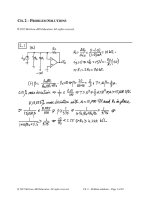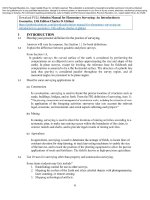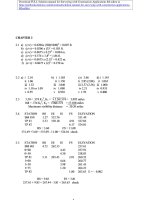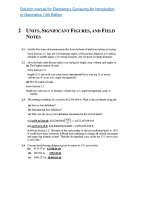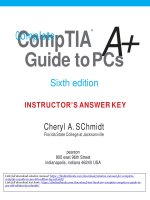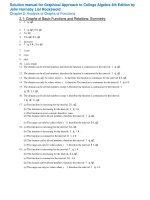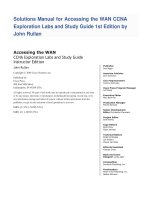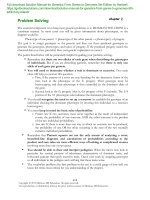Solution manual for android how to program with an introduction to java 3rd edition by deitel
Bạn đang xem bản rút gọn của tài liệu. Xem và tải ngay bản đầy đủ của tài liệu tại đây (366.11 KB, 4 trang )
2
Welcome App
Solution Manual for Android How to Program with an Introduction to Java 3rd edition
by Paul Deitel, Harvey Deitel
Link full download solution manual: />Link full download test bank: />In this chapter you’ll:
© 2017 Pearson Education, Inc., Hoboken, NJ. All rights reserved.
© Copyright 2016 by Pearson Education, Inc. All Rights Reserved.
Learn the basics of the
Android Studio IDE, which
you’ll use to write, test and
debug your Android apps.
Use the IDE to create a new app
project.
Design a graphical user
interface (GUI) visually
(without programming) using
the IDE’s layout editor.
Display text and an image in a
GUI.
Edit the properties of views
(GUI components).
Build and launch an app in the
Android emulator.
Make the app more accessible to
visually impaired people by
specifying strings for use with
Android’s TalkBack and
Explore-by-Touch features.
Support internationalization so
your app can display strings
localized in different languages.
2
Chapter 2
Welcome App
Self-Review Exercises
2.1
Fill in the blanks in each of the following statements:
a) Layout files are considered app resources and are stored in the project’s
folder. GUI layouts are placed within that folder’s layoutsubfolder.
ANS: res.
b) When designing an Android GUI, you typically want it to be
so that it displays properly on various devices.
ANS: scalable.
c) You can easily
your app by creating additional XML resource files for string resources
in other languages.
ANS: localize.
d) The two measurement units for density independentpixels are
and
.
ANS: dp and dip.
e)
enables the user to hear TalkBack speak what’s on the screen where the user touches.
ANS: Explore by Touch.
f) Android uses a special folder-naming scheme to automatically choose the correct local- ized
resources—for example, the folder
would contain a strings.xml file for French and the folder
would contain a strings.xmlfile for Spanish.
ANS: values-fr, values-es.
2.2
State whether each of the following is true or false. If false, explain why.
a) Android Studio is used to create and test Android apps.
ANS: True.
b) A RelativeLayoutarranges views relative to one another or relative to their parent con- tainer.
ANS: True.
c) A LinearLayoutarranges views horizontally.
ANS: False. A LinearLayoutarranges views horizontally or vertically.
d) To center the text in the TextView, set its alignmentproperty to center.
ANS: False. To center the text in the TextView, set its gravityproperty to center.
e) Android’s accessibility features help people with various disabilities use their devices.
ANS: True.
f) For people with visual disabilities, Android’s SpeakBack can speak screen text or text that you
provide to help the user understand the purpose of a GUI component.
ANS: False. The feature is named TalkBack.
g) It’s considered a best practice in Android to ensure that every GUI component can be used with
TalkBack by providing text for the contentDescription property of any component that does not display
text.
ANS: True.
Exercises
2.3
Fill in the blanks in each of the following statements:
a) Android Studio’s
allows you to build GUIs using drag-and-drop techniques.
ANS: layout editor.
b) For an app based on the Empty Activity template, the GUI layout is stored in an XML file called
by default.
ANS: activity_main.xml.
© 2017 Pearson Education, Inc., Hoboken, NJ. All rights reserved.
© Copyright 2016 by Pearson Education, Inc. All Rights Reserved.
,
Exercises
3
c) The default GUI for an app based on the Empty Activity template consists of a(n) (layout) and a
TextViewcontaining "Hello world!".
ANS: RelativeLayout.
d) The documentation for supporting multiple screen sizes recommends that you use den- sityindependent pixels for the dimensions of GUI components and other screen ele- ments and
for font sizes.
ANS: scale-independent pixels
e) One density-independent pixel is equivalent to one pixel on a screen with 160 dpi (dots per inch). On a
screen with 240 dpi, each density-independent pixel will be scaled by a factor of
.
ANS: 240/160 (i.e., 1.5).
f) On a screen with 120 dpi, each density-independent pixel is scaled by a factor of
. So, the same component that’s 100 density-independent pixels wide will be 75 actual
pixels wide.
ANS: 120/160 (i.e., .75).
2.4
State whether each of the following is true or false. If false, explain why.
a) For images to render nicely, a high-pixel-density device needs lower-resolution images than a lowpixel-density device.
ANS: False. For images to render nicely, a high-pixel-density device needs higher-resolution images than a
low-pixel-density device.
b) It’s considered a good practice to “externalize” strings, string arrays, images, colors, font sizes,
dimensions and other app resources so that you, or someone else on your team, can manage them
separately from your application’s code.
ANS: True.
c) You can use the Layout editor to create a working app without writing any Java code.
ANS: True.
2.5
(Scrapbooking App) Find three open source images of famous landmarks using websites such as Flickr.
Create an app in which you arrange the images in a collage. Add text that identifies each landmark. Recall that
image file names must use all lowercase letters.
ANS: This is nearly identical to the Welcome app, but consists of three ImageViews and three TextViews. Using
the layout editor, place an ImageView then TextView onto a LinearLayout, then repeat this process two more
times. Use smaller font sizes for the captions, so that more space can be used to display the
images.
2.6
(Scrapbooking App with Accessibility) Using the techniques you learned in Section 2.7, en- hance your
solution to Exercise 2.5 to provide strings that can be used with Android’s TalkBack ac- cessibility feature. If you
have an Android device available to you, test the app on the device with TalkBack enabled.
ANS: This requires the same steps we demonstrated in Section 2.7 for the Welcome app’s TextView and
ImageViews. For this exercise, apply the steps to all three TextViews and all three ImageViews.
2.7
(Scrapbooking App with Internationalization) Using the techniques you learned in Section 2.8, enhance
your solution to Exercise 2.6 to define a set of strings for another spoken lan- guage. Use an online translator service,
such as translate.google.com to translate the strings and place them in the appropriate strings.xml resource file. Use the
instructions in Section 2.8 to test the app on an AVD (or a device if you have one available to you).
ANS: This requires the same steps we demonstrated in Section 2.8 for the Welcome app’s Strings. To translate
the app’s Strings, students can use an online translation service such as or
When localizing a for-sale app, Strings should be translated by someone with
locale-specific exp©er2tis
en
hdaut cth
sen,inNeJa.chA llspriogkhetsn rlean
01e7to
Pe
arsu
sore
n tE
ateiote
nxt
, Inm
c.a
,k
Hesobsen
oke
segru
va
egde. and dialect.
© Copyright 2016 by Pearson Education, Inc. All Rights Reserved.
© 2017 Pearson Education, Inc., Hoboken, NJ. All rights reserved.
